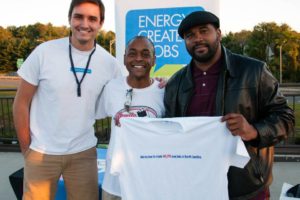Perseverance Prevails for One African-American Woman
A Career in the Oil and Natural Gas Industry
“What you do today matters and influences your future. Don’t wait to start building your foundation for success,” counsels Telisa Toliver, Vice President for Chevron Pipe Line Company during an interview to gain her perspective on careers for African-American women in the oil and natural gas industry.
Her advice is especially compelling as the oil and natural gas industry faces the retirement of scores of skilled industry workers over the next decade. This is widely expected, so much so that the industry calls this “the great crew change.” Many of these jobs could be filled with women and minorities, including African-Americans, according to an IHS study. These are well-paying jobs which can become lifelong careers, but those who are interested – especially young Americans – must begin to consider what they can do now to position themselves for the future.
Toliver is a model of what can be achieved with this focus, and can testify to the opportunities that the energy industry offers to African-American women. She started as a college intern with the oil and gas industry some 25 years ago, and is now a business unit vice president for the United States’ second largest oil company, managing business development efforts for their transportation of oil, gas, natural gas liquids, and other products.
Toliver began her career in natural gas sales and purchases when she first went to work for Chevron more than two decades ago. She then moved into upstream business development, then to supply chain management, and finally into corporate strategic planning, which ultimately led to her current position. She describes her career path as “more opportunistic than linear,” noting that she “always took advantage of opportunities” to broaden her knowledge base, so she could “fully understand the industry and be positioned for growth within the company.”
By developing an understanding of “how the various business components intersected,” staying focused on “the company’s strategic goals and objectives,” and aligning her “personal career goals and objectives with the company’s growth direction,” Toliver solidified her status as a candidate for leadership positions.
Of course, when she first started out, there weren’t as many opportunities for African-American women in the energy industry as there are now. Nevertheless, convinced that her reputation was her “best weapon against any obstacles.” Toliver concentrated on “seizing opportunities” and “producing good outcomes” and “didn’t worry too much about the perceived hurdles.”
Toliver’s creativity and can-do spirit paid off well for her, and she believes that the young African-American women of today can enjoy similar success in the energy industry.
“It’s a shame that most female students give little thought to careers in energy,” Toliver said. ”I know from personal experience that the oil and gas industry is an incredible place to work. Students should not be too shortsighted or limited about where job opportunities can be found. Don’t wait and expect for things to come along. We are all competing on a global scale, so don’t think narrowly.”
Toliver encourages high school and college students to focus on STEM courses and to look for internship opportunities. An internship “allows the company to see you in action,” she explains, “but it also provides the intern an opportunity to learn more about the company and its culture.”
Toliver rejected the idea that there was too much of a barrier presented by the fact that oil and gas companies typically recruit at engineering-based universities. When asked whether that may put students at historically black colleges and universities at somewhat of a disadvantage, Toliver said that should not be viewed as an obstacle.
”It didn’t deter me when I was a student at Tuskegee University,” Toliver said. “On the contrary, I realized that I needed to be more assertive, and landing an internship was the first step in launching my career.”
Toliver also recommends that women interested in learning more about a career in the energy industry spend time investigating and joining professional groups like the American Association of Blacks in Energy (AABE) and the National Society of Black Engineers (NSBE).
”There are tremendous opportunities in the energy sector. Those who are interested in an energy career simply need to think through the variety of disciplines in the industry, from drilling and operations and maintenance, to finance, business development, and engineering.”
“The oil and gas industry is committed to diversity and is actively recruiting minorities and women. We are expanding our network of schools and colleges to educate students about the potential opportunities, and promoting the importance of STEM education. But as many recognize, more can be done. Universities must carefully think about the needs of the industry,” she advises, “and align programs effectively.”
With the coming “crew change,” America will need talented and dedicated people to continue our energy renaissance. As Telisa Toliver is a testament, individuals who persevere will fill that pipeline and drive America’s energy leadership through the 21st century. They just need to understand, “Whatever you do today matters.”
# # #
Article by Algenon Cash, National Spokesperson for America’s Energy Forum.



